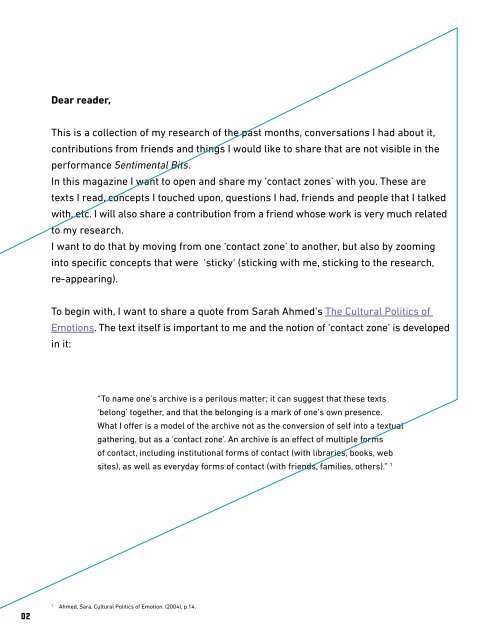K3 MAGAZIN #12
Gloria Höckner (Hamburg/Berlin) ist im K3 Residenzprogramms der Spielzeit 2021/2022. Ausgehend einer transdisziplinären Recherche, der digitale und analoge Praktiken verknüpft, eignet sich Gloria im Rahmen der Residenz Überwachungstechnologien und Systeme an, die durch künstliche Intelligenz menschliche Emotionen erkennen, um alternative Körper, Bilder und Narrationen zu entwickeln. Für die 12. Ausgabe des K3 Magazins erhalten wir einen Einblick in Glorias Recherche.
Gloria Höckner (Hamburg/Berlin) ist im K3 Residenzprogramms der Spielzeit 2021/2022. Ausgehend einer transdisziplinären Recherche, der digitale und analoge Praktiken verknüpft, eignet sich Gloria im Rahmen der Residenz Überwachungstechnologien und Systeme an, die durch künstliche Intelligenz menschliche Emotionen erkennen, um alternative Körper, Bilder und Narrationen zu entwickeln. Für die 12. Ausgabe des K3 Magazins erhalten wir einen Einblick in Glorias Recherche.
Create successful ePaper yourself
Turn your PDF publications into a flip-book with our unique Google optimized e-Paper software.
Dear reader,<br />
This is a collection of my research of the past months, conversations I had about it,<br />
contributions from friends and things I would like to share that are not visible in the<br />
performance Sentimental Bits.<br />
In this magazine I want to open and share my ‘contact zones’ with you. These are<br />
texts I read, concepts I touched upon, questions I had, friends and people that I talked<br />
with, etc. I will also share a contribution from a friend whose work is very much related<br />
to my research.<br />
I want to do that by moving from one ‘contact zone’ to another, but also by zooming<br />
into specific concepts that were ‘sticky‘ (sticking with me, sticking to the research,<br />
re-appearing).<br />
To begin with, I want to share a quote from Sarah Ahmed’s The Cultural Politics of<br />
Emotions. The text itself is important to me and the notion of ‘contact zone’ is developed<br />
in it:<br />
“To name one’s archive is a perilous matter; it can suggest that these texts<br />
‘belong’ together, and that the belonging is a mark of one’s own presence.<br />
What I offer is a model of the archive not as the conversion of self into a textual<br />
gathering, but as a ‘contact zone’. An archive is an effect of multiple forms<br />
of contact, including institutional forms of contact (with libraries, books, web<br />
sites), as well as everyday forms of contact (with friends, families, others).” 1<br />
1<br />
Ahmed, Sara, Cultural Politics of Emotion. (2004), p.14.<br />
02


